5.翻译练习-物称与人称
(5)物称与人称(内容补充)

引言
“英语较多用物称表达法,让事物以客观的形式呈 现出来,而少用人称来叙述;汉语较多从自我出发来 叙述客观事物,倾向于描述人及其行为或状态,常常 使用人称表达法。”(连淑能,1993:76-77) 总之,英 语重物称,汉语重人称。英语物称适用于正式的书面 语体,它强调物对人的作用,有拟人化修辞色彩,语 气委婉含蓄,且具客观性和公正性。汉语人称常常以 一致式的样态呈现,可用于正式或非正式的语体。汉 语句子总是以人或有生命的物体为主题展开,语言结 构规范、语义清楚。
English
Impersonal 物称 表达客观事物如何作用 于人的感知,让事物以 客观的口气呈现出来。
Chinese
Personal 人称 从自我角度出发来叙述 客观事物,或倾向于描 述人及其行为或状态。
Impersonal 物称主语
什么事发生在 什么人身上
Words fail me! 我(吓得 / 惊得)说不出话来!
Personal 人称主语 什么人怎么 样了
英语中的无灵主语
(一)具体事物 (二)时间和地点名词 (三)表身心状态和情感的名词 (四)具有动词意味的名词 (五)非人称代词“it”作形式主语 (六) “there be”句式
无灵主语后常用动词
►see,witness,speak,read, say, tell , bring ►oblige, prompt,make, drive,assure, deprive, ►remind, choke, release, fill, dull, confuse, harry ►occur ►get, gain,give,send,bring,win, possess, strike, succeed ►take, leave,lost,fail,escape, run out ►find,surround,kill,assert, serve,know, permit,invite, save,spring up, develop, owe, prevent…from, detain, deter… from
英汉主语差异研究---“物称”与“人称”

英汉主语差异研究---“物称”与“人称”摘要:英语句子较常用物称表达法,表达客观事物如何作用于人的感知,让事件以客观的口吻进行呈现,相较之,汉语句子常用人称表达法,常从自我出发来叙述客观事物。
本文对比分析英汉两种语言不同的主语选择倾向,并指出在英汉互译过程中应综合考虑各方面因素,以确保译文既符合译入语读者阅读习惯,又保持原文的表现力。
关键词:物称,人称,有灵主语,无灵主语,翻译策略一、汉英主语特点对比及原因分析句子的主语可以分为“物称主语”(impersonal subject)和“人称主语”( personal subject)两种类型。
所谓“物称主语”,即句子的主语是“物”;所谓“人称主语”,即句子的主语是“人”。
以“物”为主语的句子称为“物称主语句”;以“人”为主语的句子称为“人称主语句”。
英语主语倾向于物称化表达,常选择不能施行动作或无生命事物的词语做主语,而汉语主语则更习惯于人称化的表达,能施行动作或有生命的物体是主语之首选。
从有无生命角度划分,句子主语可分为有灵主语和无灵主语。
有灵主语是有生命特征的事物名称充当主语,如:student, teacher, doctor等。
无灵主语是无生命的事物或表示概念的抽象名词所充当的名词,如:sight, success,darkness等。
英语的物称倾向反映了西方人的客体意识。
古希腊哲学家亚里士多德所开创的形式逻辑和盛行于16至18世纪欧洲的理性主义对英语产生了深远的影响。
西方人善于用逻辑和理性思维进行思考,同时,他们推崇自然,认为自然是人类认知的主要对象,必须充分认识自然、了解自然、自然和人类同等重要。
与之相比,汉语的人称倾向反映了汉语较注重主体思维,往往从自我出发来叙述客观事物,或倾向于描述人及行为或状态。
中国人相信“天人合一(oneness between manand nature)”,强调“事在人为”、“以人为本”。
中国文化传统意义上的这种人本文化的长期积淀,形成了汉民族主体型的思维方式,即以人文为中心来观察、分析、推理和研究事物的思维。
《英汉互译实践与技巧》补充课件2:物称与人称
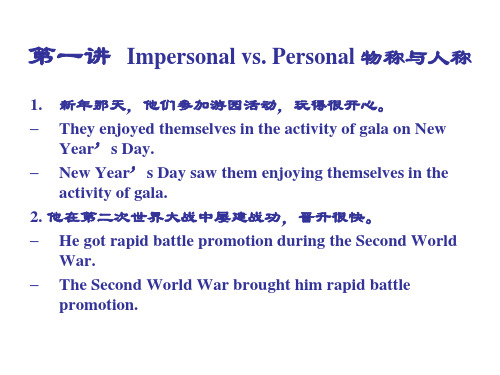
(3) 英语常用被动式
– Wrongs must be righted when they are discovered. – 发现了错误,一定要改正。 – Specialties in colleges and universities should be adjusted and teaching methods improved. – 必须调整高等院校的专业设置,改进教学方法。
2.汉译英:人称主语句变物称主语句
• (5)用表示条件、原因、方式等的名词或分词短语作主 语 • 由于计划不周,他不仅浪费了时间,而且浪费了所有钱。 • Poor planning wasted all his money as well as his time. • (6)表示生理、心理状态的名词和表示某种遭遇的名词 作主语 • 这位曾使全世界发出笑声的人自己却饱受心酸。 • Bitterness fed on the man who had made the world laugh. • (7)用具有行为和动作意义的名词作主语 • 一见到它,我就感到紧张。 • The very sight of it makes me feel nervous.
• • • •
Alarm began to take entire possession of him. 他开始变得惊恐万状。 An idea suddenly struck me. 我突然想到了一个主意。
1. 英语物称倾向的表现形式
(1)“无灵主语”+“有灵动词”
– Beijing has witnessed a great many historical events. – 北京目睹过许多伟大的历史事件。 – Your letter reached me yesterday. – 我昨天收到了你的信。
句子翻译物称和人称共26页文档

物称和人称

2 用作虚义词,代替的主语是难以言 表的现象或情形,用以表示自然现象 、时间、空间以及惯用语之中。 How is it with the sick man?
3 用作强调词,应到所需要的成分, 也是一种形式主语。 It is a good horse that never stumbles.
2. 转化非人称主语,把英语的简单句和复 杂句拆成汉语的并列句或流水句。
1) Her weariness and the increasing heat determined him to sit down in the first convening shade.他疲惫不堪,天气也越来越热,他决意一遇到个近 便的阴凉处,就坐下来休息。
信息中心位置,从而突显物称倾向。
汉语在无确定人称时,采用如有人,人们, 别人,大家等泛称或无主句,从而突显人称
倾向。
1)用作先行词代替真正的主语或宾语。 It never occurred to me that she was so dishonest. 我从来没想过她会这么不老实。
2)用作虚意词,代替的主语是难以言明的现象或者情形,如用以 表示自然现象、时间、空间以及惯用语中。 How is it with the sick man ? 那个病人怎么样了?
3. 把非人称代词主语句换成汉语的的无主句或主 语泛称句。
1) The mastery of a language requires painstaking efforts. 要掌握一门语言,必须下功夫。
2) A little flattery will fetch him. 稍一奉承就会把她迷惑住了。
4) A lack of information and formal educational training had left many persons without any generalized standards of judgment applicable to this novel situation.
物称与人称

汉人的思维习惯---汉人的思维习惯-----“有灵动词” --“有灵动词”一般 只和人称搭配。 人称搭配 只和人称搭配。但存
隐喻+ 在,隐喻+拟人
北京目睹过许多伟大的历史事件 过许多伟大的历史事件。 3)北京目睹过许多伟大的历史事件。 Beijing has witnessed many great historical events. 过去的几十年见证着我们社会的飞速发展。 4)过去的几十年见证着我们社会的飞速发展。 The past decades saw rapid development in our society.
1)Excitement deprived me of all power ) of utterance. 兴奋得什么话也说不出来。 我兴奋得什么话也说不出来。 2)The thick rpet killed the sound of ) my footsteps. 我走在厚厚的地毯上,一点脚步声也没有。 我走在厚厚的地毯上,一点脚步声也没有。
1)Voices are heard calling for help. 有人听到了呼救的声音 听到了呼救的声音。 有人听到了呼救的声音。 2)Some things have been said here tonight that ought not to have been spoken. 今晚有人在此讲了些不该讲的话。 有人在此讲了些不该讲的话 今晚有人在此讲了些不该讲的话。 中文句中的“有人”是一个泛称。) (中文句中的“有人”是一个泛称。) 3)Wrongs must be righted when they are discovered. 发现了错误,一定要改正。 发现了错误,一定要改正。
英语用抽象名词或无生命的事物名 英语用抽象名词或无生命的事物名 抽象名词或无生命的事物 称作主语,同时又使用本来表示人的动 称作主语,同时又使用本来表示人的动 作或行为的动词作谓语 作谓语, 作或行为的动词作谓语,因而这种句式 往往带有拟人化的修辞色彩,语气含蓄, 往往带有拟人化的修辞色彩,语气含蓄, 令人回味,反映了英美国家的幽默感。 令人回味,反映了英美国家的幽默感。
物称与人称

物称与人称( Impersonal vs. Personal )
原因:3、文体的需要: 科技文体、新闻文体、公文文体、论述文体
物称与人称( Impersonal vs. Personal )
– 汉语常用意义被动式(用主动形式表达被动意义) 原因:1、汉语被动式的使用受到限制: It was done. 这件事已做。 It was well done. 这件事做得好。 It was poorly done. 这件事做得不好。/这件事搞坏了。/这件事被弄坏了。/这件 事给弄糟了。 “让、给、叫、挨、受、遭、蒙”,大多表达不如意或不企 望
物称与人称( Impersonal vs. Personal )
原因:2、句法的要求: 为了使句子承上启下、前后连贯、便于衔接 Some kinds of plastics can be forced through machines which separate them into long, thin strings, called “fibres”, and these fibres can be made into cloth. 为了使句子平衡,保持末端中心和末端重量,以 符合主语简短、谓语复杂的表达习惯 I was astonished that he was prepared to give me a job.
Beijing has witnessed a great many historical events. 北京目睹过许多伟大的历史事件。
物称与人称( Impersonal vs. Personal )
– 英语常用被动式,采用物称表达法;汉语常用主动 式,采用人称、泛称或隐称表达法。 Wrongs must be righted when they are discovered. 发现了错误,一定要改正。 Specialties in colleges and universities should be adjusted and teaching methods improved. 必须调整高等院校的专业设置,改进教学方法。
英语人称代词和物主代词专项练习

一、人称代词的用法1、人称代词的主格在句中作主语。
如:We love our country. 我们爱我们的祖国。
She is a good student. 她是一名好学生。
2、人称代词的宾格在句中作动词、介词的宾语,还可作表语使用。
如:I don't know him. 我不认识他。
His mother is waiting for them outside. 他妈妈在外面等他们。
---Who's it? ---It's me. ---那是谁?---那是我。
3、人称代词的语序几个人称代词并列作主语时,它们的顺序是:单数形式(2,3,1)you, he and I复数形式(1,2,3)we, you and they二、物主代词的用法1、形容词性物主代词在句中作定语修饰名词,一般不单独使用。
2、名词性物主代词常用来避免和前面提及的名词重复。
相当于“形容词性物主代词+名词”。
3、名词性物主代词可用在of后面作定语,相当于“of+名词所有格”,表示带有部分概念或有一定的感情色彩。
如:He is a friend of mine. 他是我的一个朋友。
一、用适当的人称代词填空:1. __________ is my aunt. We often visit __________.2. China is a developing country. _________ lies in the east of Asia.3. Professor Wang sets ________ a good example. We must learn from ________.4. What day is __________ today? — __________ is Thursday.5. How far is the thunder ? — __________ is three kilometers away.6. I own a blue bike. The red one doesn’t belong to __________.7. These new houses are so nice. __________ are very expensive.8. __________ say that those old houses will be rebuilt.9. Is __________ the milkman at the door? —Yes, that’s __________.10. The fishermen caught a lot of fish, didn’t __________?11. Ling Ling is a girl. ____ studies in a primary school. Her brother lives with____ and helps ____ to prepare the lessons.12. The ship is lying at anchor (停泊) . ____ comes from Shanghai.13. This photo of your mother is very much like her. I like ____.14. Mike is my classmate. ____ is good at physics .15. Kate wants a glass of milk. Will you pass it to ____ ?16. What’s the weather like today ? ____ is cloudy.二、用形容词性物主代词和名词性物主代词填空1. I ate all ____ sandwiches yesterday. Can I have one of ____ ?2. Tell Tom not to forget ____ book. And you mustn’t forget ____ .3. George has lost ____ pen. Ask Mary if(是否)she will lend him ____ .4.. Jack has a dog and so have I. ____ dog and ____ had a fight (打架).5. The teacher wants you to return that book of ____6. Mr. and Mrs. Green and a friend of ____ are coming to see us.7. Mary wants to know if(是否)you’ve seen a pair of gloves of ____ .8. We are going to Paris to stay with a French friend of ____ .三、用适当的人称代词和物主代词填空A. 从括号内选择正确的代词填空1. Your football clothes are on the desk.Please put _________(they,them,their,theirs) away.2. (We,Us,Our,Ours)_________ English teacher is Mrs. Green.We all like _________(she,her,hers).3. (I,Me,My,Mine)_________ can’t get my kite.Could you help _________(I,me,my,mine)?4. Tom can’t get down from the tree.Can you help _________(he,him,his)?5. Her kite is broken. Can _________(you,your,yours) mend it?6. We can’t find our bikes.Can you help _________(we,us,our,ours)?7. These are _________(he,him,his) planes.The white ones are _________(I,me,mine).B. 填入正确的人称代词和物主代词1. This isn’t her knife. _________ is green.2. These are your books,Kate. Put __________ in the desk,please.3. You must look after ________ things.4. Wei Fang,is that ________ ruler? Yes,it’s.5. They want a football. Give __________ the green one,please.6. It’s Lin Tao’s bag. Give ________ to __________.7. Is this pencil-box Li Lei’s? No,___________ is very new.8. This box is too heavy. I can’t carry _________.Don’t worry,Let __________ help __________.9. _____ is a boy _____ name is Mike. Mike’s friends like _____ very much.10. My sister is in _____ room. _____ is a teacher.11. Jane is a little girl. _____ mother is a nurse.12. We are in _____ classroom. _____ classroom is big.13. My father and mother are teachers. _____ are busy14. You are a pupil. Is _____ brother a pupil, too?四、用括号中的适当形式填空A)(1)Are these ________(you)pencils?Yes, they are ________(our).(2)—Whose is this pencil?—It’s ________(I).(3)I love ________(they)very much.(4)She is________(I)classmate.(5)Miss Li often looks after________(she)brother.(6)—Are these ________(they)bags ?—No, they aren’t ________(their). They are ________(we).B)1. This bike is my sister`s. It belongs to ______ (她的)。
英汉语言对比物称与人称

汉语人称倾向
02
相比之下,汉语更倾向于使用人称表达法,强调主观感受和情
感。
翻译策略
03
在翻译过程中,应根据原文的语境和语义,选择合适的物称或
人称表达法,以传达原文的准确意义。
翻译中的人称选择
第一人称
在描述特定事件或观点时,使用 第一人称代词(如“we”、 “us”、“I”、“me”)可以 增强文章的直接性和说服力。
WENKU DESIGN
WENKU DESIGN
2023-2026
ONE
KEEP VIEW
英汉语言对比物称与 人称
WENKU DESIGN
WENKU DESIGN
WENKU
REPORTING
https://
CATALOGUE
目 录
• 引言 • 英汉语言物称表达 • 英汉语言人称表达 • 物称与人称选择的影响因素 • 物称与人称选择在翻译中的应用 • 结论
语用功能
在英语中,物称表达方式可以用于委婉地表 达自己的观点和情感,避免直接提及对方。 而在汉语中,人称表达方式可以更加直接地 表达自己的观点和情感,强调对方的责任和 义务。
PART 05
物称与人称选择在翻译中 的应用
翻译中的物称选择
英语物称倾向
01
在英语中,物称表达法更常见,强调客观性,减少主观色彩。
人称转换
在汉译英时,如果汉语句子使用人称表达法,可以 将其转换为英语的物称表达法,以符合英语的表达 习惯。
语境考虑
在转换物称或人称时,需要考虑原文的语境 和语义,确保译文准确地传达了原文的意义 和语气。
PART 06
结论
研究成果总结
英语倾向于使用物称表达法,强调客观性,而汉 语则更倾向于使用人称表达法,强调主观性。
英语人称代词和物主代词练习题附答案
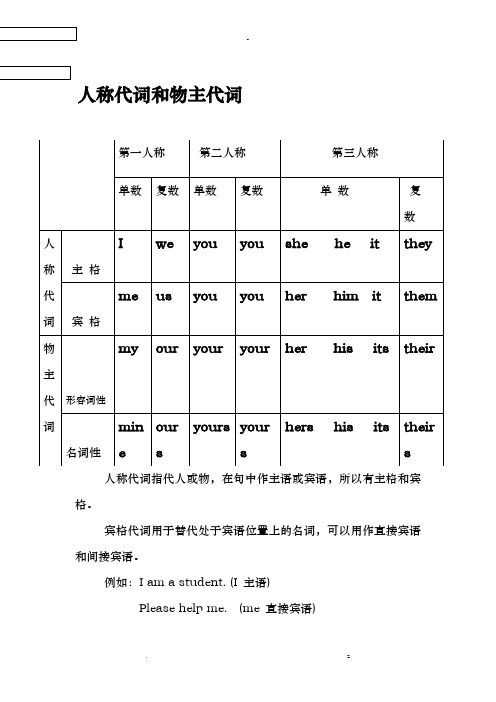
-人称代词和物主代词人称代词指代人或物,在句中作主语或宾语,所以有主格和宾格。
宾格代词用于替代处于宾语位置上的名词,可以用作直接宾语和间接宾语。
例如:I am a student. (I 主语)Please help me. (me 直接宾语)Give me a book. (me 间接宾语)物主代词是表示所有关系的一种代词,亦称所有格代词。
物主代词有两种形式:形容词性物主代词和名词性物主代词。
形容词性物主代词为限定词,放在名词或名词短语前作定语。
如:This is my book.名词性物主代词起名词的作用,后面不可以再接名词。
在句子中可以作主语、宾语或表语。
如:1. Your pen is red. Mine is black.你的钢笔是红色的,我的是黑色的。
2. He didn’t use his ink. He used mine.他没有用他自己的墨水,他用了我的。
3. That book is hers, not yours.那本书是她的,不是你的。
英语代词练习题I.选择填空1.He is_________(our/ours) English teacher. _________name is Sam〔男人名〕.2. Jane (女人名) is my friend. She has got long hair. _______hair is yellow.But_________(my/mine) is black.3._________(mine/my) dog is white .But_________(her/hers) is black.4.--Whose puter is it ? Is it your father’s ? --No,it’s not________.It’s my mother’s. -- Oh, it’s__________. (it’s =___ ___)5. -- Look ! _________car is it ? Is it__________(your/yours) ?-- No,_________(our/ours) car is old (旧的).-- It’s_________(their/theirs) car .__________is new.II.用括号中单词的适当形式填空1.--Are these___________(you) pencils.--Yes ,they are_________(our).2. –Whose pencil is this ?—It’s_________( I ).3.She is__________( I ) friend.4.Miss Li often look after (照顾)_________(she) brother.5.—Are these_________(they) bags .--No,they aren’t ________(their). They are______(we) . (aren’t =______ ______)6.This bike is my sister’s . It is________(she).7.This isn’t_______( I ) book . ________(my) is in the bag. (is’t =____ _____)III.填入正确的人称代词和物主代词1.This is n’t_______knife. ________is green. (she)2.These are your books, Kate. Put______in de desk,please. (they) 3.______must look after (照顾)_______things. (you )4.Wei Fang, is that_______ruler ? Yes, it’s . (you)5.They want(想要) a football . Give_______the green one. Please.(they)6.It’s Lin Tao’s bag . Give it to________. (he)7.Is this pencil-bo* Li Lei’s ? No,_______is very(非常) new.(he) 8.This bo* is too heavy(很重). I can’t carry(携带)_____.(it) (can’t =_____ _____)Don’t worry ,Let_______( I ) help_______. (you)9.______is a boy. ______name is Mike(男人名). Mike’s friendslike_____very much(非常). (he)10.My sister is in______room. _______is a teacher. (she)11.Jane is a little girl . _____mother is a nurse(护士). (she)12.We are in______classroom. ______classroom is bag. (we)13.My father and mother are teachers. ______are busy(繁忙). (them)14.You are a pupil(儿童). Is_______brother a pupil , too ? (you)15.I ate(eat的过去分词) all______sandwiches yesterday. (I) Can I haveone of_______.(they)16.Jack(男人名) has a dog and so have I(我也有一只). ______(he)dogand_____(I) had a fight(打架).17.George(男人名)has lost(丧失了)_______(his) pen. Ask Mary(女人名) if(是否)she will lend(借) him_______.(she)18.The teacher wants you to return that book of________.(he)19.Mr and Mrs. Green(男人名)and a friend of________are ing to see us.(they)20.We are going to Paris(巴黎) to stay with a French(法国) friendof________(we).IV.根据汉语提示填空〔汉语只是个提示,不要照搬翻译〕1._______(她)is a student. _______(她)sister is a student too.2.________(我)want_______(你) to do it today.3.________(他)brother is a worker(工人). ________are twins(他们).4.________(你们)are English. ________(我们)are Chinese.5.All of(所有)________(我们)love______(我们)teacher.6.This is______(我)book. That is_______(你).7.These pens are_______(他们).______(你们)are over there(在那边).8.Can_____(你)read it for_______(我们).V. 补全对话1.----Whose bike is it ? Is it______(your/yours)?----No,it’s not______.(my/mine) _______is red. But this bike is blue .----Is it Jane’s ?----Sorry, I don’t know. Maybe it’s_______.----Jane,is this______bike ?----No,it’s not______.You can ask Bill(男人名). Maybe it’s________.----Bill,is this bike_______ ?----Oh,yes,it’s_______bike.Thank you very mnch!2.----Whose classroom is it ? Is it_______(our/ours)classroom ?----No,it’s not________. It’s_________(their/theirs)----__________(their/theirs) classroom is big.----Yes ,you are right.----But_______is small.VI.根据句意用适当人称代词、物主代词填空1.Mary works in a bookstore(书店). ______likes_____work very mnch. 2.Jone and I are in the same(一样的) school. ______go to school together(一起).3.She is a friend of_______. We got to know each other(彼此、互相) two years ago.4.Her sister makes all______own(自己的) dresses.5.I have many friends. ______are all good at(擅长于) English.6.----May I use(使用)_______bike ?----_______is broken(故障、坏的).VII.根据汉语意思补全句子1.This is_______father. 这是我的爸爸。
6.英汉对比之物称与人称汇总
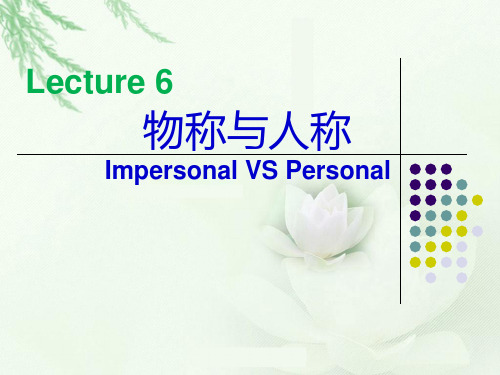
3)具体事物作主语。 我们迎着朝阳来到甲板上。 The morning sun greeted us as we came out on the deck. 他收到一份紧急电报,匆匆去了洛杉矶。 An urgent telegraph hurried him to Los Angeles. 4)具有动词意味的名词作主语。 (人们)发现新物种后就可以研制新药。 The discovery of new species will lead to new drugs. 他想起这些,便会增加生活的热情。 The remembrance of these will add zest to his life.
2. 把汉语流水句转换成英语复合句。
我感到很饿,又发现日影移动,这是我明白:自从我 睡着以后,太阳已走了很长的路了。 My hunger and the shadows tell me that the sun has done much travel since I fell asleep. 谁想要理解拿破仑其人及其对近代欧洲所产生的影响, 谁就得稍微注意他的家族特征。 The Characteristics of his family claim some attention from all who would understand Napoleon and the influence which he was to wield ove把非人称主语转换成汉语的状语或介词短语:
英语人称代词和物主代词练习题(答案)

英语人称代词和物主代词练习题(答案)-CAL-FENGHAI.-(YICAI)-Company One1人称代词和物主代词人称代词指代人或物,在句中作主语或宾语,所以有主格和宾格。
宾格代词用于替代处于宾语位置上的名词,可以用作直接宾语和间接宾语。
例如:I am a student. (I 主语)Please help me. (me 直接宾语)Give me a book. (me 间接宾语)物主代词是表示所有关系的一种代词,亦称所有格代词。
物主代词有两种形式:形容词性物主代词和名词性物主代词。
形容词性物主代词为限定词,放在名词或名词短语前作定语。
如:This is my book.名词性物主代词起名词的作用,后面不可以再接名词。
在句子中可以作主语、宾语或表语。
如:1. Your pen is red. Mine is black.你的钢笔是红色的,我的是黑色的。
2. He didn’t use his ink. He used mine.他没有用他自己的墨水,他用了我的。
3. That book is hers, not yours.那本书是她的,不是你的。
英语代词练习题I.选择填空1.He is_________(our/ours) English teacher. _________name is Sam(男人名).2. Jane (女人名) is my friend. She has got long hair. _______hair is yellow.But_________(my/mine) is black.3._________(mine/my) dog is white .But_________(her/hers) is black.4.--Whose computer is it Is it your father’s--No,it’s not________.It’s my mother’s. -- Oh, it’s__________. (it’s =___ ___)5. -- Look ! _________car is it Is it__________(your/yours)-- No,_________(our/ours) car is old (旧的).-- It’s_________(their/theirs) car .__________is new.II.用括号中单词的适当形式填空1.--Are these___________(you) pencils--Yes ,they are_________(our).2. –Whose pencil is this—It’s_________( I ).3.She is__________( I ) friend.4.Miss Li often look after (照顾)_________(she) brother.5.—Are these_________(they) bags--No,they aren’t ________(their). They are______(we) . (aren’t =______ ______) 6.This bike is my sister’s . It is________(she).7.This isn’t_______( I ) book . ________(my) is in the bag. (is’t =____ _____)III.填入正确的人称代词和物主代词1.This is n’t_______knife. ________is green. (she)2.These are your books, Kate. Put______in de desk,please. (they)3.______must look after (照顾)_______things. (you )4.Wei Fang, is that_______ruler Yes, it’s . (you)5.They want(想要) a football . Give_______the green one. Please. (they) 6.It’s Lin Tao’s bag . Give it to________. (he)7.Is this pencil-box Li Lei’sNo,_______is very(非常) new.(he)8.This box is too heavy(很重). I can’t carry(携带)_____.(it) (can’t =_____ _____) Don’t worry ,Let_______( I ) help_______. (you)9.______is a boy. ______name is Mike(男人名). Mike’s friends like_____verymuch(非常). (he)10.My sister is in______room. _______is a teacher. (she)11.Jane is a little girl . _____mother is a nurse(护士). (she)12.We are in______classroom. ______classroom is bag. (we)13.My father and mother are teachers. ______are busy(繁忙). (them)14.You are a pupil(儿童). Is_______brother a pupil , too (you)15.I ate(eat的过去分词) all______sandwiches yesterday. (I) Can I have oneof_______.(they)16.Jack(男人名) has a dog and so have I(我也有一只). ______(he)dog and_____(I)had a fight(打架).17.George(男人名)has lost(丢失了)_______(his) pen. Ask Mary(女人名) if (是否)she will lend(借) him_______.(she)18.The teacher wants you to return that book of________.(he)19.Mr and Mrs. Green(男人名)and a friend of________are coming to see us. (they)20.We are going to Paris(巴黎) to stay with a French(法国) friend of________(we). IV.根据汉语提示填空(汉语只是个提示,不要照搬翻译)1._______(她)is a student. _______(她)sister is a student too.2.________(我)want_______(你) to do it today.3.________(他)brother is a worker(工人). ________are twins(他们).4.________(你们)are English. ________(我们)are Chinese.5.All of(所有)________(我们)love______(我们)teacher.6.This is______(我)book. That is_______(你).7.These pens are_______(他们).______(你们)are over there(在那边).8.Can_____(你)read it for_______(我们).V. 补全对话1.----Whose bike is it Is it______(your/yours)----No,it’s not______.(my/mine) _______is red. But this bike is blue .----Is it Jane’s----Sorry, I don’t know. Maybe it’s_______.----Jane,is this______bike----No,it’s not______.You can ask Bill(男人名). Maybe it’s________.----Bill,is this bike_______----Oh,yes,it’s_______bike.Thank you very mnch!2.----Whose classroom is it Is it_______(our/ours)classroom----No,it’s not________. It’s_________(their/theirs)----__________(their/theirs) classroom is big.----Yes ,you are right.----But_______is small.VI.根据句意用适当人称代词、物主代词填空1.Mary works in a bookstore(书店). ______likes_____work very mnch. 2.Jone and I are in the same(相同的) school. ______go to school together(一起).3.She is a friend of_______. We got to know each other(彼此、互相) two years ago.4.Her sister makes all______own(自己的) dresses.5.I have many friends. ______are all good at(擅长于) English.6.----May I use(使用)_______bike----_______is broken(故障、坏的).VII.根据汉语意思补全句子1.This is_______father. 这是我的爸爸。
第五章 物称与人称
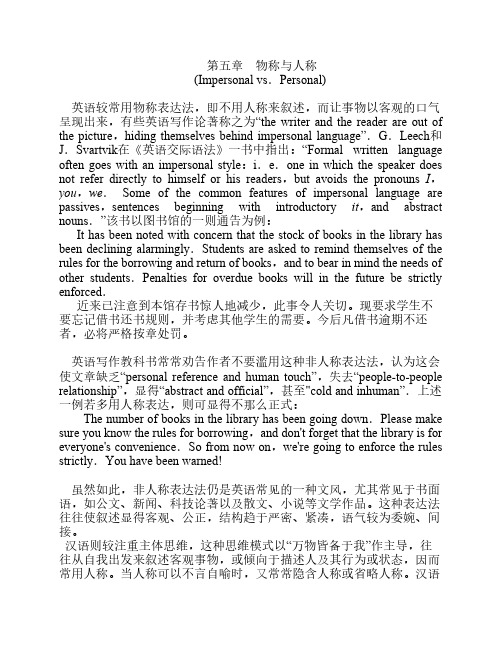
第五章物称与人称(Impersonal vs.Personal)英语较常用物称表达法,即不用人称来叙述,而让事物以客观的口气呈现出来,有些英语写作论著称之为“the writer and the reader are out of the picture,hiding themselves behind impersonal language”.G.Leech和J.Svartvik在《英语交际语法》一书中指出:“Formal written language often goes with an impersonal style:i.e.one in which the speaker does not refer directly to himself or his readers,but avoids the pronouns I,you,we.Some of the common features of impersonal language are passives,sentences beginning with introductory it,and abstract nouns.”该书以图书馆的一则通告为例:It has been noted with concern that the stock of books in the library has been declining alarmingly.Students are asked to remind themselves of the rules for the borrowing and return of books,and to bear in mind the needs of other students.Penalties for overdue books will in the future be strictly enforced.近来已注意到本馆存书惊人地减少,此事令人关切。
英译汉物称与人称
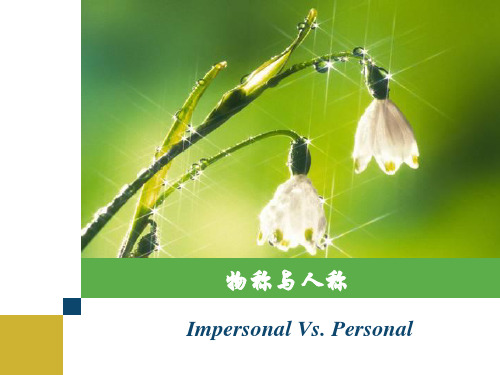
It was surprising that I met her that time. The year of 1949 witnessed this accident.
2
It has been noted with concern that the stock of books in the library has been declining alarmingly. Students are asked to remind themselves of the rules for the borrowing and return of books, and to bear in mind the needs of other students. Penalties for overdue books will in the future be strictly enforced. 近来本馆的图书大量减少,数目惊人,我们对此 表示极为关切。现请学生们切勿忘记借还规则, 并考虑其他同学的需要。今后凡借书逾期不还者, 必将严格按章处罚。
16
五四运动以后,开始了“新红学时代”,代 表人物有胡适、俞平伯等一些学者。 The May Fourth Movement of 1919 saw the beginning of the New Redology, represented by such scholars as Hu Shi and Yu Pingbai.
11
汉语思维习惯:很少使用无灵主语,只有在 拟人修辞时使用无灵主语。
北京目睹过许多伟大的历史事件。 星光很早以前就踏上了旅程。 Beijing has witnessed many historical events. The light from the stars started on its journey long long ago.
第5章 物称与人称(英汉对比研究)
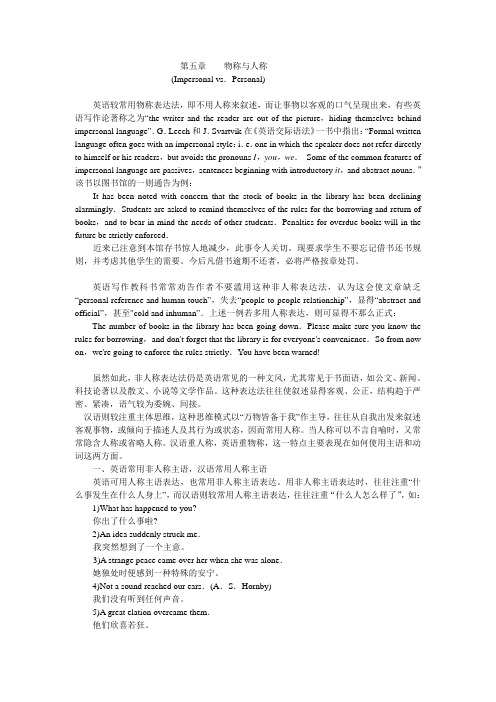
第五章物称与人称(Impersonal vs.Personal)英语较常用物称表达法,即不用人称来叙述,而让事物以客观的口气呈现出来,有些英语写作论著称之为“the writer and the reader are out of the picture,hiding themselves behind impersonal language”.G.Leech和J.Svartvik在《英语交际语法》一书中指出:“Formal written language often goes with an impersonal style:i.e.one in which the speaker does not refer directly to himself or his readers,but avoids the pronouns I,you,we.Some of the common features of impersonal language are passives,sentences beginning with introductory it,and abstract nouns.”该书以图书馆的一则通告为例:It has been noted with concern that the stock of books in the library has been declining alarmingly.Students are asked to remind themselves of the rules for the borrowing and return of books,and to bear in mind the needs of other students.Penalties for overdue books will in the future be strictly enforced.近来已注意到本馆存书惊人地减少,此事令人关切。
英汉语言对比物称与人称
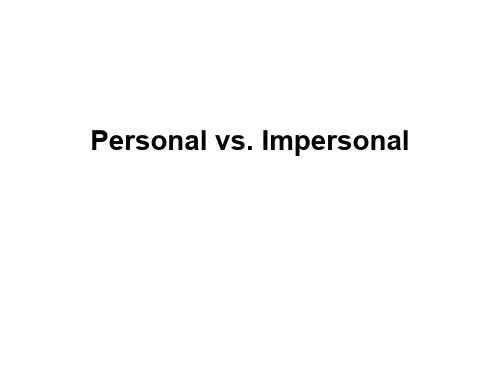
Conclusion:
1)Impersonal subjects are often used in English 英语常用非人称主语 ,注重“什么事发生在什么 人身上”
2)Personal subjects are often used in Chinese 汉语常用人称主语 ,注重“什么人怎么样了”
• G. Leech and J.Svartvik point out: 1) Formal written language often goes with an impersonal style including official style, news, science and technology style etc.
• 1) 我们没有听到任何声音 Not a sound reached our ears
• 2) 她独处时便感到一种特殊的安宁 A strange peace came over her when she was alone.
• 3) A great elation overcame the客观事物如
何作用于人的感知,让事物以客观的口气呈现出
来。
Impersonal English:
the writer and the reader are out of the picture, hiding themselves behind impersonal language
• 3) 凭良心讲,你待我礼貌有加,我却受之有愧。
• My conscience told me that I deserved no extraordinary politeness.
• 4) 五四运动以后,开始了“新红学”时代,代表 人物有胡适、俞平伯等这样一些学者。
句子翻译物称与人称
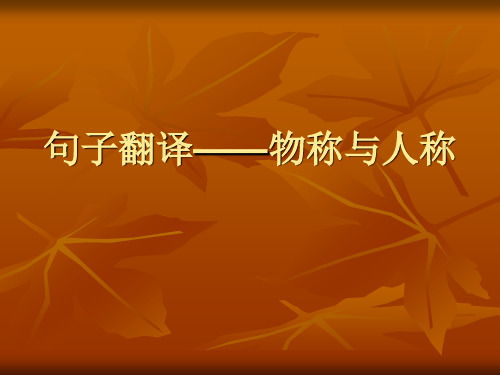
二、为了加强上下文的连贯性
英语中,常常为了上下文的连贯,使句子之间的衔接紧密 自然而运用被动结构。为此目的,在汉译英时也常常将汉 语的主动句改翻译为英语的被动句。如:
他出现在台上,观众给予热烈鼓掌。
He appeared on the stage and was warmly applauded by the audience.
英汉被动句式结构的差异
尽管英语的被动意义有时可以不用被动式 来表达,但总的说来,
英语常用结构被动式,少用意义被动 式。与此相反,汉语则常用意义被动 式,少用结构被动式。
ight I was covered up with two quilts. 困难克服了,工作完成了,问题也解决了。
不带被动标记的汉语被动句
这类句子在形式上一般都有主语,也有动 词,但是主语在实际上是谓语动词的动作 承受者,而不是执行者。动作执行者并未 出现。这种句子结构上为主动句,而含义 上是被动句。这一类被动句在汉语中大量 存在,英译时一般也要用被动语态来处理。 例如:
这座桥将在今年年底建成。
The construction of the bridge will be completed by the end of this year. (under examination/ consideration/ construction)
茅屋为秋风所破。The Thatched house was destroyed by the autumn storm.
她被花言巧语所陶醉。She is intoxicated with sweet words.
“是……的”式,即表示状态的静句,通常可以与表示动作 的动句互相转换,如: 这些产品是我国制造的。These products are made in our country. 风速是用秒米表示的。The speed of wind is expressed in metres by second.
- 1、下载文档前请自行甄别文档内容的完整性,平台不提供额外的编辑、内容补充、找答案等附加服务。
- 2、"仅部分预览"的文档,不可在线预览部分如存在完整性等问题,可反馈申请退款(可完整预览的文档不适用该条件!)。
- 3、如文档侵犯您的权益,请联系客服反馈,我们会尽快为您处理(人工客服工作时间:9:00-18:30)。
5.翻译练习: 物称与人称
班级:英语翻译2班姓名:贺秀娣学号:22
Translate the following sentences. Pay special attention to the underlined part of each sentence. 1.Nightfall found him many miles short of his appointed preaching place.
夜幕降临时,他离他指定的讲道地点还有好几英里。
2.His addition completed the list.
她的加入完善了这张名单。
3. Not too much can or should be read into the percent.
不是很多可以读成百分数。
4. Blood spilled on both sides.
血流了满地。
5. His action was prompted by the fear of being attacked.
他害怕被拘捕的情绪导致了他的行为。
6. A second term would give the President more power than was safe for republic institutions.
再一次的期限没有了共和国体系带来了安全而是给了总统更多的权利。
7. The evening of the speech contest saw his efforts in improving his spoken English bearing fruit. 演讲比赛的那天晚上,见证了他在提高英语口语方面所付出的努力得到了收获。
8. That night sleep eluded him.
那天晚上他一点困意都没有。
9. Dawn met him well along the way. It was a pleasant uneventful ride.
一路上有黎明陪伴着它,那是一个令人愉快而又平静的行程,
请将下列句子译成英文。
1. 她从来没有想到过他是一个不诚实的人。
She has never thought that he is a dishonest person.
2.热烈欢迎世界各地客商来此进一步加强合作,建立和发展贸易关系。
Warm welcome to the all the business merchants from all over the world to come here to develop deeper cooperation, build up and develop the relationship of trade.
to up a relation of peace.
3.这位母亲很为有个聪明漂亮的女儿骄傲。
This mother is very proud of his smart and beautiful daughter.
4.一个星期前我遇上了一件最不可思议的事情。
An inconceivable thing was happened to me last week.
5.因为天气太糟,未能成行。
The trip was quitted for the bad weather。
6.我见到他就恶心。
As soon as I saw her,I feel sick。
7.他们的表演很成功,引起了媒体的广泛关注。
They get widely attention of media with the success of their performance.
8.不怕一万,就怕万一。
Not afraid of ten thousand but just in case.。
